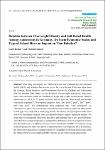Relation between Overweight/Obesity and Self-Rated Health Among Adolescents in Germany. Do Socio-Economic Status and Type of School Have an Impact on That Relation?
Krause, Laura
Lampert, Thomas
This study investigates the relation between overweight/obesity and self-rated health (SRH), and whether this relation varies by social factors. Data was taken from the German Health Interview and Examination Survey for Children and Adolescents (KiGGS, baseline 2003‒2006). For the definition of overweight and obesity, body mass index was calculated based on standardized height and weight measurements. SRH of adolescents (n = 6813, 11‒17 years) was raised with the question: “How would you describe your health in general?” The response categories were “very good”, “good”, “fair”, “poor”, and “very poor”. We dichotomized these responses into: “very good/good” vs. “fair/poor/very poor”. Socio-economic status (SES) in the family of origin and adolescents’ school type were analyzed as modifying factors. Prevalence and age-adjusted odds ratios with 95% confidence intervals were calculated by binary logistic regression models. We found that overweight and obese boys and obese girls reported fair to very poor SRH more often than their normal weight peers, and that these differences were more apparent in early than late adolescence. In addition, the relation between obesity and SRH was similarly strong in all sub-groups, but there was seldom a relation between overweight and SRH. In summary, the results show that obesity is linked to poor SRH regardless of SES and school type, while the relation between overweight and SRH varies by social factors among adolescents.
Dateien zu dieser Publikation
Keine Lizenzangabe

